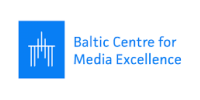Collaboration with NGOs as a way to foster societal resilience
Kristina Berksun
01-03-2024
Collaboration with NGOs from different spheres can be a powerful tool to foster societal resilience. It allows integration of different educational forms, as well as reaching much more different audiences. Such activities also help to unite towards common goals, rather than acting alone, BECID experience shows.

One recent example of such a collaborator is the joint event of BECID and “Nepatogus kinas” (Inconvenient Films) – an media education platform in Lithuania – held on February 21st. During the virtual event, a documentary movie “And the King Said What a Fantastic Machine” (2023), that presents the history of the image starting from the first cameras and pictures to today’s Instagram, was shown and a seminar, conducted by BECID experts Auksė Balčytienė and Kristina Juraitė, was organized.
The event was dedicated to teachers, educators and youth workers. The aim of it was to renew and strengthen knowledge of media impact on us, especially young people, and discuss what kind of media literacy is most needed today, as well as more deeply discuss the topics presented in the movie.
With the help of “Nepatogus kinas”, an organization having experience of more than 18 years and a great network of 4000 teachers and 260 libraries from all around Lithuania, the attendance of the event reached more than 440 registered participants.
According to A. Balčytienė, it is very important to learn from high-quality examples. One such, according to the professor, is the film “And the King Said What a Fantastic Machine”.
“We are all in the field of information warfare, attacked by misinformation, fake news, and political propaganda. Media literacy could be a tool of strengthening that resistance for school children. We really need to be vigilant, to look deeper, wider. This film helps to see more layers and to think about a wider context”, says K. Juraitė.
According to representative of “Nepatogus kinas” Emilija Statinaitė, documentary movies are easy to understand, other than artistic movies that can have many interpretations. “Documentary has a clear message and is about real life. Our goal is to empower and encourage teachers, educators, youth workers or librarians to use this tool widely” says E. Statinaitė.
“How to deepen youth media literacy with the help of this film? Through creative, analytical methods, discussions, reflections, through raising questions, exchanging opinions and perspectives, as well as creating, testing video media yourself. The idea of media literacy is that we must develop a sense of quality, answer to ourselves what content meets our quality criteria and be guided by them when choosing and creating content. Creativity without knowledge, media and information literacy is unthinkable. The most important thing is knowledge, understanding, and a value base, which is formed from a young age”, comments K. Juraitė.

In the repertoire of “Nepatogus kinas” there are many other movies that could be used for educational purposes and integrated into the informal education programs, such as, for instance, about influencers or TikTok platform. This year the program is going to extend its repertoire – movies about AI, fake news will be added too.
According to E. Statinaitė, all “Nepatogus kinas” projects and initiatives are implemented in partnerships with different organizations, and all the activities are a combination of watching a documentary movie and reflecting it during other activities, such as seminars, discussions, workshops, etc.
“We encourage people to consciously include the media in their life, and we are making efforts to do so in creative ways. We constantly invite representatives of other organizations and fields, experts to contribute, create and develop activities together. We believe that through common discussions changes can be made” says E. Statinaitė.
“Nepatogus kinas” also has a separate open and free of charge platforms, dedicated to educators, especially teachers or youth workers, as well as separate communities, with a packet of movies, which are accompanied by educational, methodological packages that educators can include in their training programs.
“Our aim is that those, who don’t have an infrastructure of possibilities, would be able to see quality content and learn from it. Our purpose is that people would feel empowered to speak about these important topics, and we are doing so through different collaborations”, says E. Statinaitė.







